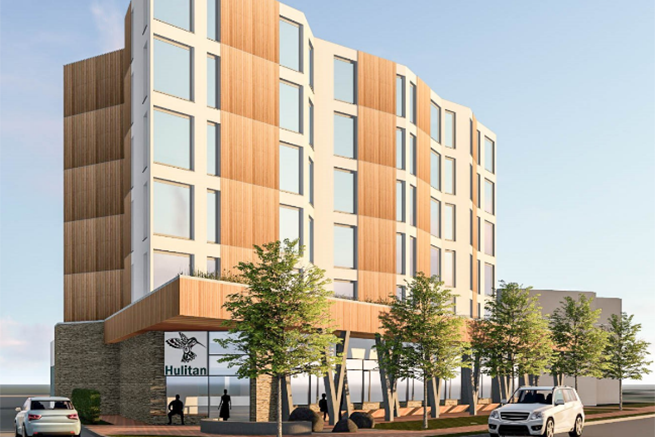Forty new homes for Indigenous people will be added to a 60-unit development under construction in Langford, the province announced Thursday.
The B.C. government will spend $8 million to create 40 new two- and three-bedroom units at M’akola Housing Society’s development on Station Avenue. The rent for those 40 units will be tied to tenants’ income, and B.C. Housing will select tenants through its registry.
“As we looked at the housing challenges right across British Columbia when we formed a government 16 months ago, what we saw was an absolute lack of Indigenous housing on reserve and off reserve,” Premier John Horgan said Thursday at a news conference on the building site. “Housing is foundational to our lives, to our success as individuals, and to a community.”
The $8 million in funding comes from the Indigenous Housing Fund, which will earmark half a billion dollars over 10 years for 1,750 new homes for Indigenous people across B.C.
“We’re in an affordable housing crisis, this government recognizes it,” said Langford Mayor Stew Young.
Young credited his council for cutting red tape and pushing affordable housing projects through quickly.
“Sometimes you just have to move forward, bulldoze through it and get done what needs to be done,” he said.
The 60 units under construction were funded through a $12-million investment from the previous B.C. Liberal government. Construction on the first phase of the project, a six-storey apartment building is expected to be complete by March 2020. The rents for those units will range from $640 a month for a studio to $1,500 a month for a three-bedroom unit.
The first phase of the building also includes office space for two Indigenous non-profit societies: M’akola Development Services, which consults on Indigenous housing developments, and Hulitan Family and Community Services Society, which offers culturally sensitive services for Indigenous youth and families.
Kevin Albers, CEO of M’akola Group, said the organization has been housing Indigenous families in Langford for 32 years, with the first affordable housing project built in 1986. “To see it go from one house … all the way up to 100 houses is pretty amazing,” he said.
Russ Chipps, chief of Beecher Bay First Nation, said he’s encouraged by the new housing for Indigenous people, saying it’s one step toward eradicating homelessness. “Homes for everybody, same as everybody else,” he said.
“There’s always need for more [housing]. The world’s not perfect, but everybody’s doing their best to make it better.”



